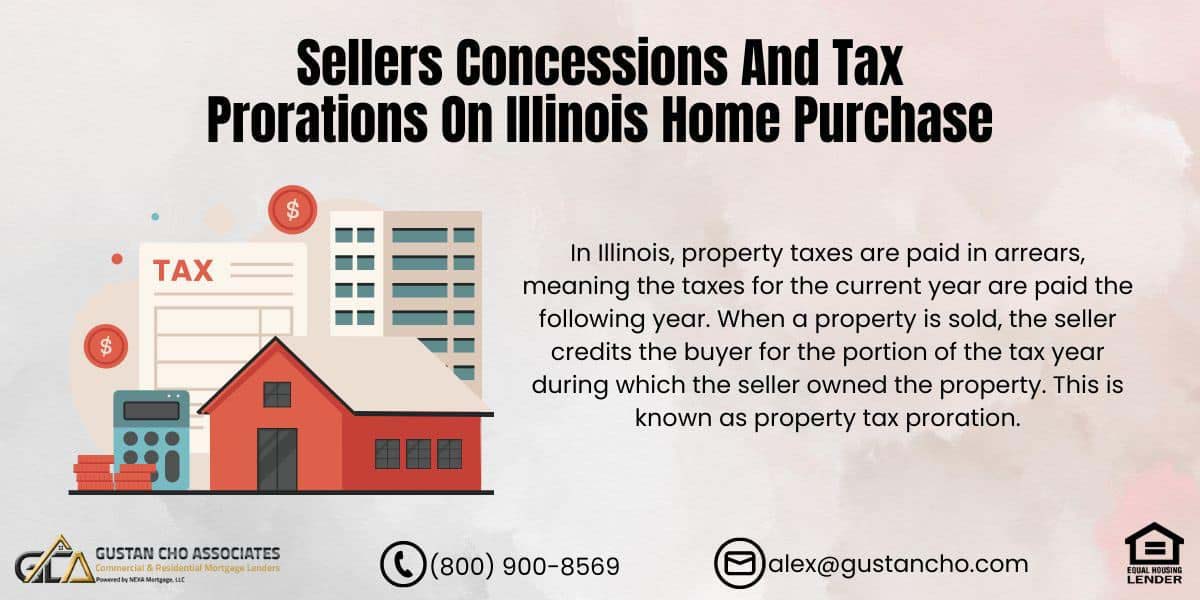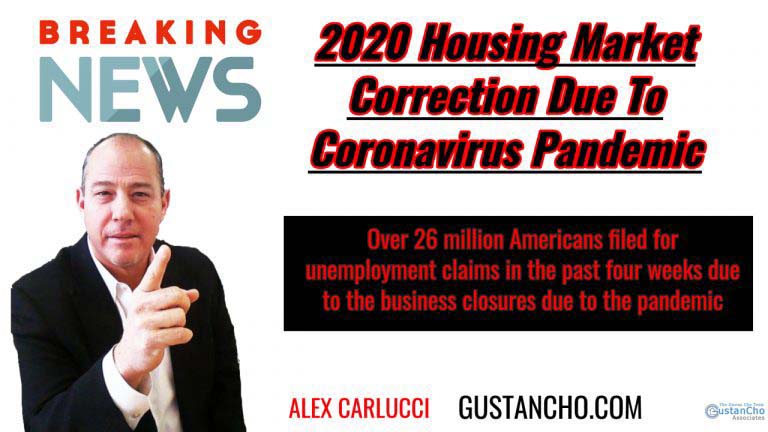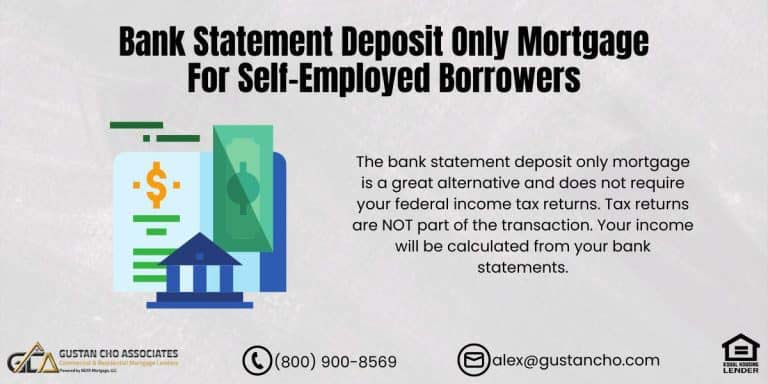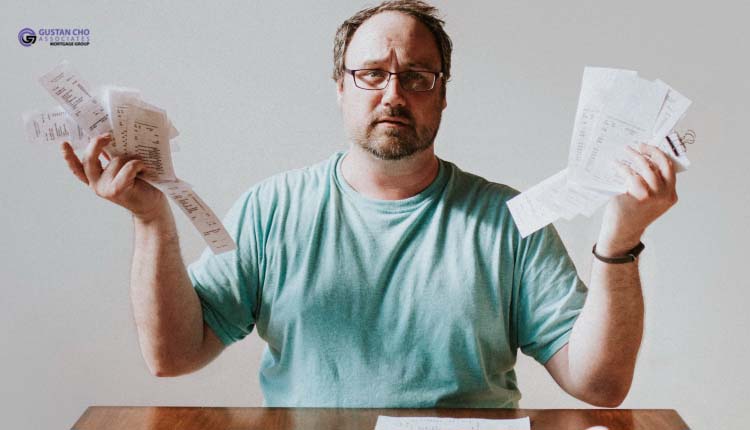Understanding Sellers Concessions and Tax Prorations in Illinois Home Purchases
Illinois home buyers benefit from a unique financial advantage that sets them apart from buyers in many other states. Illinois is characterized by its system, where property taxes are paid in arrears. This means that sellers must credit buyers with the property taxes for the year during a home purchase, a process known as property tax prorations.
These property tax proration credits provide a significant benefit to buyers. Specifically, they can be applied toward the initial down payment and the closing costs of purchasing a home. This system of Sellers Concessions and Tax Prorations not only eases the financial burden on buyers but also streamlines the transition of property ownership in Illinois.
Do Sellers Pay Property Taxes at Closing in Illinois?
In Illinois, it is customary for sellers not to pay property taxes directly at the time of closing. Instead, the approach involves prorating the property taxes. Here, sellers credit the buyer for the taxes corresponding to the duration the seller owned the property within the tax year until the closing date.
This process, known as tax prorations, ensures the financial responsibilities are fairly allocated based on ownership duration.Illinois property taxes are retrospectively billed, which means the tax bill for any given year is actually paid the following year.
At the closing, the buyer receives a credit for the seller’s share of the next tax bill, which is part of the seller’s Concessions and Tax Prorations. Once the tax bill is released, the buyer is responsible for the full amount. However, the seller has effectively covered the portion of the tax period during which they owned the property, ensuring that taxes are only paid by the actual property owners during their respective ownership periods.
Selling Your Home in Illinois? Learn How Sellers’ Concessions and Tax Prorations Can Benefit You!
Contact us today to understand how these factors can impact your sale and purchase process.
Costs Associated With Home Purchase In Illinois
Illinois home buyers planning to purchase a property will require funds for the down payment and closing costs. Many buyers aim to minimize their initial financial outlay by reducing the down payment and incorporating the closing costs into their mortgage loans.
Despite these strategies, it remains essential for buyers to demonstrate that they possess the necessary funds for the down payment. This requirement ensures financial readiness and eligibility for the intended mortgage, especially when leveraging Sellers Concessions and Tax Prorations to facilitate their home purchase.
Home Purchase With No Money Out Of Pocket
There are scenarios in which home buyers can acquire properties without any initial cash outlay and occasionally even receive cash back after their purchase. Although it may appear improbable, FHA mortgage loans necessitate a minimum down payment of 3.5%.
Conventional loans generally demand down payments of 3% or 5%. However, this can be achieved with the assistance of knowledgeable and skilled real estate professionals.
Home buyers can strategically navigate these financial requirements by engaging a seasoned realtor and a competent mortgage loan officer. These professionals have the expertise to negotiate and arrange real estate contracts that minimize or eliminate the need for closing costs and substantial down payments. This approach often involves leveraging Sellers Concessions and Tax Prorations, which can significantly reduce the upfront financial burden on the buyer.
Make Sure To Get Sellers Concessions Towards Buyers Closing Costs
Closing costs are third-party fees typically amount to 2% to 6% of a home’s purchase price. This range varies based on the state and county where the property is being purchased. Sellers’ concessions play a significant role in managing these costs for buyers. Such concessions are permissible under FHA, VA, USDA, conventional mortgage loans, NON-QM Loans, Bank Statement Loans for self-employed borrowers, and Jumbo Mortgages.
Specifically, FHA and USDA loans can include up to a 6% seller’s concession towards the buyer’s closing costs. In comparison, VA loans allow up to 4%.
These concessions from sellers can cover various expenses associated with closing costs, including prepaid items like mortgage insurance premiums and discount points. By utilizing seller concessions and tax prorations, buyers can significantly reduce the immediate financial burden associated with purchasing a home.
Sellers Concessions Overages
However, any leftover sellers concession credit towards a buyer’s closing costs cannot go to the buyer if there are leftover funds.
- It needs to go back to the seller for any unused sellers concessions
- However, any overages in sellers concessions can be used to buy down the mortgage interest rate
- Conventional loans and jumbo loans allow a maximum of 3% sellers concessions towards buyers closing costs on primary second homes
- 2% on investment homes
- Home Buyers can structure sellers concessions towards buyers closing costs the right way where a home buyer does not have to bring in a dime for closing costs to the closing table
- Sellers concessions cannot be applied towards buyers down payment
If the borrower is short in closing costs with sellers concessions, they can get lender credit in lieu of slightly higher mortgage rates by the lender.
Buying a Home in Illinois? Don’t Miss Out on Sellers’ Concessions and Tax Prorations!
Reach out now to find out how these options can benefit your Illinois home purchase.
What Closing Costs Do Sellers Pay in Illinois?
In Illinois, sellers typically have several closing costs associated with the sale of a property. The expenses may differ depending on the details of the transaction, customary practices in the area, and the conditions set in the sales contract. Here are the common closing costs that sellers in Illinois might expect to pay:
- Real Estate Agent Commissions are often the largest expense for sellers when closing. The total commission is typically around 5% to 6% of the sale price, split between the buyer’s and seller’s agents.
- Title Insurance: It is common for sellers to cover the cost of the owner’s title insurance policy, which protects the buyer against any potential title problems.
- State and County Transfer Taxes: In Illinois, sellers pay state and county transfer taxes. The state transfer tax is $0.50 per $500 of the sale price, and county rates vary.
- Attorney Fees: It’s common for sellers in Illinois to hire an attorney to help with the closing process. The attorney’s fees depend on the complexity of the transaction and the attorney’s rates.
- Prorated Property Taxes: Sellers credit the buyer for the portion of the property taxes that cover the period the seller owned the property during the tax year up to the closing date.
- Miscellaneous Fees: This can include recording fees, notary fees, and fees related to satisfying any existing liens or mortgages.
- Survey Costs: Depending on the agreement with the buyer, if a new survey of the property is required, the seller might need to pay for it.
- Home Warranty: In some cases, to make the offer more attractive, sellers might agree to pay for a home warranty covering the buyer for appliances and systems issues for the first year of ownership.
Negotiations can adjust these costs, as the financial responsibilities of each party can differ from one sale to another. Sellers should meticulously review the purchase agreement and consult with their real estate agent or attorney to fully understand their obligations at closing, including considerations for Sellers Concessions and Tax Prorations.
Down Payment For Home Purchase In Illinois
Minimum down payments for a conventional loan are either a 3% down payment or a 5% down payment.
- For FHA loans, the minimum down payment is 3.5%
- Down payment funds need to be seasoned and sourced
- FHA insured mortgage loans allow down payments to be gifted
- However, a gift letter must be signed by the donor
- The money leaving the donor’s bank account into the recipients’ bank account must be sourced and provided
Normally, a 30-day bank statement of the donor is required and a deposit slip and deposit to the receiver’s account needs to be provided.
Down Payment Needs To Be Sourced And Seasoned
The borrower must retain the 3.5% down payment in their bank account until closing. This rule applies unless the home buyer purchases a brand-new property directly from a builder. In such cases, the standard practice of receiving a tax proration from the seller may not occur.
Sellers Concessions and Tax Prorations: While tax proration credits can be applied to both the down payment and closing costs, sellers’ concessions are specifically meant to cover closing costs. They cannot be used to pay the down payment.
Sellers Concessions And Tax Prorations Credit To Be Used Towards Down Payment Of Home Purchase
Consider a scenario where a home buyer is interested in purchasing a home priced at $100,000 and aims to minimize the initial down payment and out-of-pocket expenses for closing costs. The buyer is approved for an FHA-insured mortgage, and the property taxes for the home amount to $4,000 annually.
A seller’s concession of 6% is proposed. Although the sellers aim for a net receipt of $100,000, this setup implies they agree to structure the deal to include a seller’s concession to cover some of the buyer’s closing costs. Consequently, the home’s listing price is adjusted to $106,000, assuming it will be appraised at this value.
For this purchase price, the buyer must provide a down payment of 3.5%, which calculates to $3,710 based on the $106,000 adjusted price. This strategic use of Sellers’ Concessions And Tax Prorations effectively reduces the buyer’s upfront financial burden.
Ready to Buy a Home in Illinois? Let’s Maximize Sellers’ Concessions and Tax Prorations to Save You Money!
Contact us today to learn how these tools can help you save on your new Illinois home.
Sellers Concessions And Tax Prorations To Cover Closing Costs On Home Purchases
The buyer must pay the initial year’s homeowner’s insurance premium in advance. However, they can allocate a portion of the $6,000 seller’s concession they receive to cover this insurance, along with attorney fees, appraisal fees, title insurance charges, and any other applicable closing costs. It’s assumed that the total $6,000 from the seller’s concessions fully addresses the buyer’s closing costs.
The buyer will benefit from $4,000 in tax proration credits provided by the seller, which reflects that property taxes in Illinois are paid a year in arrears. These tax proration credits of $4,000 can be applied to offset the down payment required, which amounts to $3,710.
As a result of this arrangement, the home buyer will effectively have an extra $290.00 after all transactions are completed at closing. This scenario demonstrates the effective use of seller concessions and tax prorations to reduce upfront costs for home buyers in Illinois.
Sellers Concessions And Tax Prorations And Down Payment Benefits
In this scenario, the home buyer successfully purchased a property without any initial cash outlay and even had a cash surplus of $290.00. Although a 3.5% down payment was required, the substantial Sellers Concessions and Tax Prorations provided meant that no out-of-pocket expense was necessary for acquiring the property. Such outcomes are typically observed when the Seller’s Concessions and Tax Prorations are significant.
Illinois home buyers seeking more information about Seller Concessions and Property Tax Prorations can contact Gustan Cho Associates. You can reach us at 800-900-8569 or text us for a quicker response. Our email address is alex@gustancho.com.
How to Prorate Property Taxes in Illinois?
Prograding property taxes in Illinois starts:
- Start by obtaining the total annual property tax from the tax bill or the county assessor’s website.
- To calculate the amount of tax per day, divide the total annual tax by the number of days in a year, which is 365.
- Determine the closing date of the property transaction, which is when ownership transfers from the seller to the buyer.
- Calculate the number of days the seller owned the property in the tax year, starting from January 1st or when they acquired the property if it was within the same year, up to the closing date.
- Multiply the days by the daily tax rate to determine the seller’s share of the taxes.
During closing, this amount is usually credited to the buyer, who will then be responsible for paying the full year’s taxes when they are due but will have received a credit for the time the property was owned by the seller. Remember that property taxes in Illinois are paid in arrears, meaning the tax bill for any given year is paid the following year, which should be factored into the transaction.
FAQs: Sellers Concessions And Tax Prorations On Illinois Home Purchase
- What are property tax prorations in Illinois? In Illinois, property taxes are paid in arrears, meaning the taxes for the current year are paid the following year. When a property is sold, the seller credits the buyer for the portion of the tax year during which the seller owned the property. This is known as property tax proration.
- Can property tax prorations be used towards down payments and closing costs in Illinois? It’s possible to use property tax proration credits to cover the buyer’s closing costs and down payment. This can significantly reduce the upfront cash required from the buyer at closing.
- Do sellers in Illinois pay property taxes at closing? Sellers do not directly pay property taxes at closing in Illinois. Instead, they credit the buyer for their share of the upcoming property taxes for the period they owned the property.
- What closing costs are typically paid by sellers in Illinois? Sellers in Illinois may be responsible for several closing costs, including real estate agent commissions, owner’s title insurance, state and county transfer taxes, attorney fees, and other miscellaneous fees such as recording and notary fees. They also prorate property taxes and may pay for a home warranty or survey costs if agreed upon.
- How can Illinois home buyers purchase a home with minimal upfront costs? Buyers can work with experienced realtors and mortgage loan officers who can effectively use seller concessions and other strategies. For instance, seller concessions can cover closing costs. In some scenarios, buyers can also receive lender credits for a slightly higher mortgage rate.
- What are seller concessions, and how do they work? Seller concessions are funds the seller agrees to provide to help cover the buyer’s closing costs. These can include prepaid items like mortgage insurance and discount points. FHA and USDA loans permit seller concessions of up to 6%, whereas VA loans allow for concessions of up to 4%. Conventional and jumbo loans typically allow up to 3% for primary residences and 2% for investment properties.
- What happens to any leftover seller concessions? If there are unused seller concessions after all buyer’s closing costs are covered, the excess amount cannot be given to the buyer as cash but can be used to buy down the mortgage rate, enhancing the loan’s affordability.
- How are down payments sourced and seasoned in Illinois? Down payments must be sourced and seasoned, meaning the funds should be traceable and have been in the borrower’s account for a specified period. FHA loans allow down payments, but documentation such as a gift letter and bank statements must be provided to show the transfer from the donor to the recipient.
- How can a home buyer in Illinois end up with no money out of pocket at closing? By strategically using seller concessions and tax prorations, a buyer might not only cover all closing costs but also reduce or eliminate the need for an out-of-pocket down payment. In some cases, buyers can even receive a small amount of cash back at closing, depending on the structure of the deal and the amount of seller concessions and tax prorations.
If you have any questions about Sellers Concessions And Tax Prorations On Illinois Home Purchase or you need to qualify for loans with a lender with no overlays, please contact us at 800-900-8569. Text us for a faster response. Or email us at alex@gustancho.com. The team at Gustan Cho Associates is available 7 days a week, on evenings, weekends, and holidays.
Related> Sellers Concessions Will Offset Closing Costs For Home Buyer
Related> Sellers Concession Overage
This blog about Sellers Concessions And Tax Prorations On Illinois Home Purchase was updated on May 13th, 2024.
Want to Save on Your Illinois Home Purchase? Let Us Explain Sellers’ Concessions and Tax Prorations!
Contact us now to find out how to leverage these in your Illinois home purchase.









